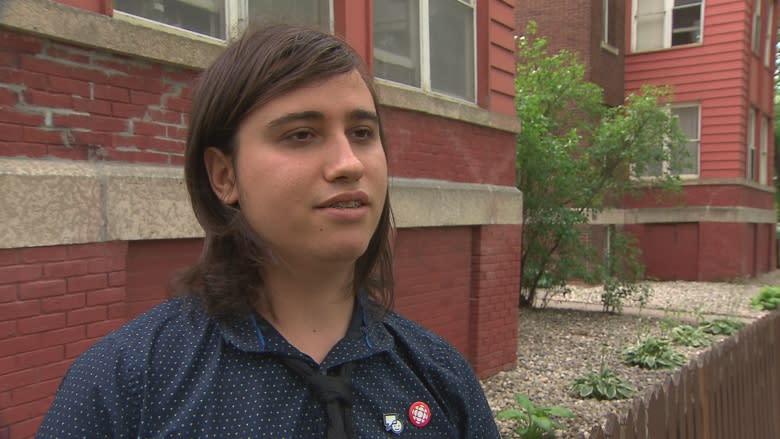Recreation therapy positions chopped from HSC mental health program
Patients with mental illness at the Health Sciences Centre in Winnipeg will feel the latest round of health-care cuts as the recreation therapy program — which provides life skills and leisure — is downsized.
There are two recreation therapists working with the patients in five mental health units at the Health Sciences Centre. Last week, hospital management told them both of their positions would end in November.
"I still have passion but I just don't have patients," said Erin Flynn, a recreational therapist with the Health Sciences Centre's mental health services.
"Honestly, I was shocked that we were cut, especially in mental health. A lot of talk right now is the importance of providing good mental health care for patients across Canada," she said.
The cuts are part of the Winnipeg Regional Health Authority's government-mandated plan to save $83 million this budget year. Despite the cost cutting, Flynn thought she would be safe, given her line of work.
"Knowing that we're in a mental health crisis in Canada, it surprised me that we would see deletions and cuts within those services."
Many of the patients Flynn works with have a chronic mental illness that severely impacts their ability to live, work and have positive relationships, she said. She sees anywhere from six to 20 patients a day.
Her program includes group therapy, activities in the community, one-on-one visits, exercise and the co-ordination of volunteer groups that host activities such as cooking classes.
Recently, Flynn and the other recreation therapist distributed iPods with music suited to individual patients' tastes.
"It helps them to reduce anxiety, depression, agitation while they're on the unit; it provides them with a glimmer of hope and something to look forward to in their day when they're really dealing with significant illness and not knowing what their life holds," she said.
The therapy the recreation therapists provide is an important part of patients' treatment and recovery, Flynn said.
When patients are in hospital, a recreation therapist can take them out on day passes and connect them with supports or help them overcome panic attacks so they can do things like ride the bus.
The rec therapist is instrumental in helping patients who often feel isolated regain confidence, self-esteem and a feeling of belonging in society, she said.
"Without recreation therapy in the hospital, all of those valuable community connections, community resources, won't exist. I can't see other therapists and other team members being able to pick up the pieces that we will leave when we go."
'Devastating' for patients
Brendan Kupchik called the loss of the recreation therapists at the Health Sciences Centre mental health program "devastating."
The 25-year-old was an inpatient there for two months while being treated for psychosis and schizophrenia.
"I felt desolate in the hospital and it was a situation where I couldn't relate to many people. I found that it was tough finding people to speak to or talk to or relate to," he said.
While he was waiting to be seen by health professionals, the recreation therapist visited him with video games, crafts and other activities.
"It made it possible for me to talk to these people, to relate and to express ideas through art and crafts," he said.
He worries about what will happen to patients with fewer recreational therapists working at the hospital.
"I feel almost despair because without that program, there's no other way for people to communicate with each other than conversation but people are so out of it at the hospital that it's hard for people to relate," he said.
A spokesperson for the WRHA said although two of the three recreation therapists within mental health services at the HSC have lost their positions, one will continue to serve all mental health units and psychiatric health.
Flynn said she's concerned about how the five floors of patients will fare with only one recreation therapist. Nursing staff already tell her the patients need more recreation therapy, she said, not less.
"I think the most frustrating, the most disheartening component of all these cuts is we as staff will move on and we will find other jobs. We will retrain. We have resources, we have E.I.," she said.
"We leave our patients behind. They will still be there and we won't, so that touches on my heart, because the patients are the reason why I come to work."
Are you affected by the health-care?
Do you have information or documents you want to share?
Confidentially reach reporter Erin Brohman at erin.brohman@cbc.ca



